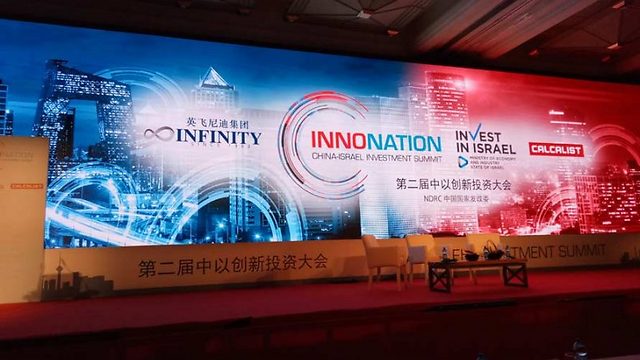
They came ready to invest, and even on the plane on the way over, signed a deal to establish a $200 million fund to invest in Israeli medical technologies. At Innonation, they were able to meet one on one with dozens of Israeli business representatives.
“We are looking for investment opportunities in Israel and we will help them in development and marketing,” said Liu Hao Peng, of New Alliance, a Shanghai based investment fund. “We aim to help them settle down in China and to manufacture their product in China.”
This conference is a follow-up to one in Beijing in January of this year, where sponsored by Infinity, a private equity fund backed by the China Development Bank and Clal Industries. At that conference, hundreds of Chinese investors met representatives of 100 Israeli companies.
The conference brought many of the Chinese investors to Israel. “The goal of the summit is to be the main mediator between Chinese investors and Israeli technology companies,” said Leora Jesselson of Infinity. “There’s a lot of money in China, and they are competing with the US in buying technology.”
She continued by saying that Israel is seen as a technology powerhouse, and that many Chinese admire Israeli entrepreneurship. There are already about 1,000 Israeli start-ups that have enjoy some amount of some Chinese investment or is involved in Chinese manufacturing. China has also recently bought a controlling interest in the Israeli food company Tnuva, as well as Ahava, which deals in Dead Sea products.
The summit hopes to make connections to bring Israeli technologies to the consumer market. It is organized by Amir Gal-Or, the founder of Infinity, who has lived for the past 16 years in China.
Amir’s son Amit, 20, a student at NYU-Shanghai, has also become involved in the action, forming a company called Phresh.
“We partnered with an Israeli agricultural company, which created organic solutions to preserve specific types of fruit and vegetables,” Gal-Or told The Media Line. “So they had a product for grapes, another for potatoes, and one for strawberries. We combined all of these, so it’s like a cocktail of a single solution that kills a wide variety of bacteria in your refrigerator.” The yougner Gal-Or claimed that the product can extend the shelf-life of fruits and vegetables by several weeks.
While China is seen as very interested in Israeli companies, their corporate cultures are very different, which can create misunderstandings. Leora Jesselson of Infinity said that Israeli entrepreneurs can be impatient, wanting to close a deal immediately, while Chinese investors often want the Israelis to visit several times.
Failure is also seen very differently. In Israel, there is no stigma to failing, and many of the most successful companies came after repeated failures. In China, failure is considered an embarrassment, and some Chinese investors are seemingly hesitant to take risks, fearing that they will fail.
Article written by Linda Gradstein
Reprinted with permission from The Media Line
http://www.themedialine.org/

















